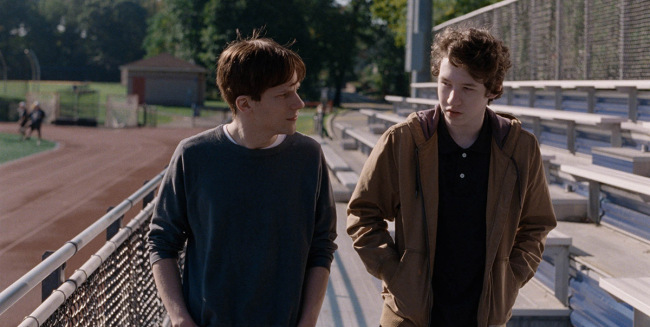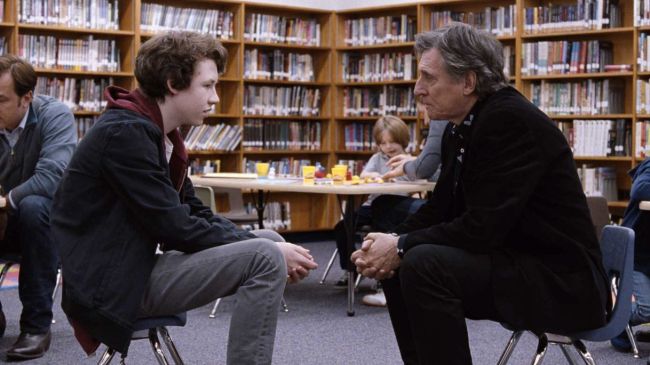Few actors, male or female, are better at portraying an innate sense of mystery than the great French actress Isabelle Huppert. Her face seems to hold dozens of expressions all at once. You get the sense that there’s always something deeper underneath — and that you’ll never really know all of it.
And so it should be little surprise that Huppert is the most watchable and, yes, mysterious element of “Louder Than Bombs,” by Norwegian director Joachim Trier — even though her character is already dead. The film — intimate and often moving, yet ultimately too disjointed to feel satisfying — examines her character’s life only in flashback, exploring the effects of her loss on family members. And yet, though we want to know more about her than we get, she’s the most vibrant presence onscreen.
 |
| Still from “Louder than Bombs” (Memento Films) |
Huppert plays Isabelle Reed, a celebrated war photographer. Despite a career spent flirting with danger in far-off locales, her death has come in the most mundane of places: On a road near her home in suburban New York, in a car crash.
Isabelle has left three men behind to grieve, all in crucial states of transition. Her husband, Gene (a thoughtful Gabriel Byrne) is a former film actor now teaching in the local school. Her older son, Jonah (Jesse Eisenberg) is a wunderkind university professor and new father, a responsibility he seems highly ambivalent about (when, oh when will Eisenberg play a sympathetic character? Not here.) And her youngest, Conrad (Devin Druid, touching), is just trying to get through high school, adolescence and a painful first crush, not to mention cope with the death of his mother.
The action, such as it is — the film progresses in a decidedly nonlinear fashion — begins three years after Isabelle’s death. Gene is helping to organize a retrospective of his wife’s work, a project that will involve the dredging up of some unpleasant truths. Richard (David Strathairn), a dashing former colleague of Isabelle’s, is writing an article to accompany the show, and tells Gene he’ll have to address the true cause of Isabelle’s death, which was reported as an accident.
 |
| Still from “Louder than Bombs” (Memento Films) |
Not to give away too much, but each man in the film seems to be at a different place in his understanding of — or explanation for — the tragic event. And so we see different scenarios of the crash unfold.
This multiple-perspectives technique is one favored by Trier, who’s making his English-language debut here, throughout the film (Eskil Vogt cowrote the screenplay.) At one point, we see Gene, concerned about Conrad, surreptitiously follow his son from a park to a cafe to a cemetery, trying to figure out his behavior. Only later, when we see the scene replayed from Conrad’s perspective, do we understand what the heck he was doing.
But what the heck is anyone doing in this movie? One might say that every character in this study of a family in disarray means to do the right thing, but has a strange way of showing it. Everyone misbehaves. Eisenberg’s Jonah is the first person we see in the film, holding the sweet, tiny finger of his newborn baby in the hospital, marveling over this new life. Moments later, though, he runs into an old girlfriend and lies, bald-faced (and hilariously), about the reason he’s in the hospital. Apparently he’s not quite comfortable with his new role as a father.
In the end, though, blood runs thick; the final tableau seeks to remind us that families can survive an awful lot and remain intact. It’s not the most sophisticated or deepest conclusion Trier could have reached, but his storytelling techniques — and that face of Huppert’s, which we could have used more of — have at least made the journey interesting. (AP)
By Jocelyn Nobeck



